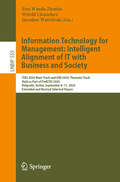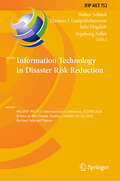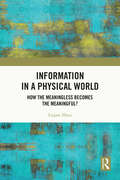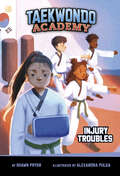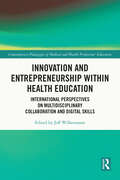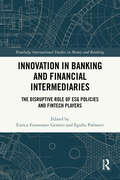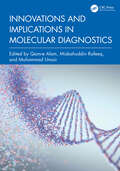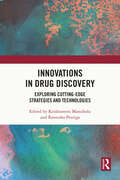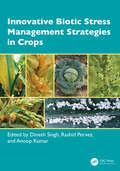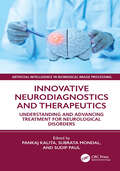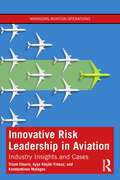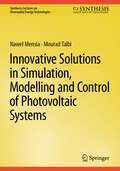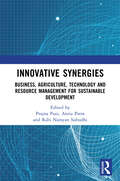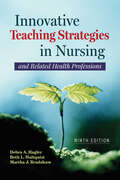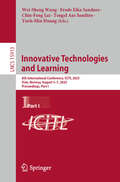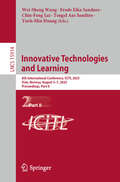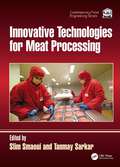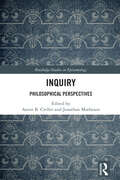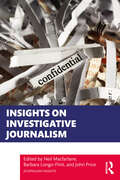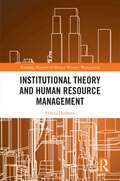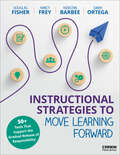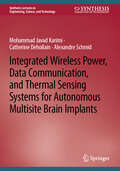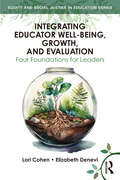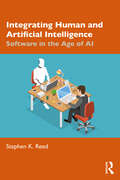- Table View
- List View
Information Technology for Management: ITBS 2024 Main Track and ISM 2024 Thematic Track, Held as Part of FedCSIS 2024, Belgrade, Serbia, September 8–11, 2024, Extended and Revised Selected Papers (Lecture Notes in Business Information Processing #555)
by Witold Chmielarz Jarosław Wątróbski Ewa Wanda ZiembaThe present book includes extended and revised versions of selected papers submitted to the Topical Area of Information Technology for Business and Society, ITBS 2024, and the Thematic Track on Information System Management, ISM 2024, held as part of the 19th Conference on Computer Science and Intelligence Systems, FedCSIS 2024, which took place in Belgrade, Serbia, during September 2024. ITBS 2024 received 14 submissions, from which 3 full papers and 3 short papers have been accepted; for ISM 2024, 3 full papers have been accepted from 8 submissions. The accepted papers are grouped in sections on Business-IT Alignment and Digital Transformation; Consumer Insights and Intelligent Decision Making; and Research Methods for Analytical Approaches to IT Applications.
Information Technology in Disaster Risk Reduction: 9th IFIP WG 5.15 International Conference, ITDRR 2024, Krems an der Donau, Austria, October 14–16, 2024, Revised Selected Papers (IFIP Advances in Information and Communication Technology #752)
by Julie Dugdale Thomas J. Lampoltshammer Walter Seböck Ingeborg ZellerThis volume constitutes the refereed and revised post-conference proceedings of the 9th IFIP WG 5.15 International Conference on Information Technology in Disaster Risk Reduction, ITDRR 2024, held in Krems an der Donau, Austria, during October 14–16, 2024. The 18 full papers presented in this volume were carefully reviewed and selected from 21 submissions. The papers were organized in topical sections as follows: Information for Disaster Management; Training; Evacuation; Reliability in Decision-making; War and Safety Issues; Information and Community Disaster Management.
Information in a Physical World: How the Meaningless Becomes the Meaningful?
by Liqian ZhouTo construct a comprehensive theory of information, meaning and intentionality, the book develops a naturalistic perspective based on Peircean biosemiotics. It re-examines key issues such as referential information, the metaphysics of form, misrepresentation, reference and sense, offering new explanations and insights.It analyzes the notion of information conceptually, showing that it is not a simple concept, but rather comprises hierarchically nested aspects: Structural, referential and normative. By defining form negatively as a constraint, it offers a naturalistic account of structural information. It then addresses the normativity of referential relations through the concept of interpretation, introducing the notion of operational interpretation to explain the minimal normativity of reference. The book further argues that the three types of reference—symbolic, indexical and iconic—are asymmetrically interdependent: Symbolic reference depends on indexical reference, which in turn depends on iconic reference. This semiotic framework helps to resolve many long-standing problems in the philosophy of language. Finally, the book argues that convention is inherently a semiotic concept. As such, symbolic reference has two aspects of conventionality: The sign vehicle and the referential relation. This semiotic explanation offers a deeper understanding of real-world communication scenarios.The book will be of interest to researchers and advanced students in philosophy of mind, philosophy of language, philosophy of biology, philosophy of cognitive science, semiotics, biosemiotics and linguistics.
Injury Troubles
by Shawn PryorWhen Aria hurts her shoulder, she's left feeling frustrated that she is letting her taekwondo team down right before a big tournament. Master Areeno encourages her to look past her injury to consider how she can still support her teammates. Will Aria put her disappointment aside for the sake of her team?
Innovation and Entrepreneurship within Health Education: International Perspectives on Multidisciplinary Collaboration and Digital Skills (Contemporary Pedagogies of Medical and Health Professions’ Education)
by Jeff WilkesmannRecognizing the growing significance of innovation and entrepreneurship in the field of health education, this novel volume discusses digital skills, collaborative learning and contemporary curricular challenges in order to foster innovative and entrepreneurial mindsets.Against the backdrop of an evolving healthcare system characterized by the delivery of consumer-led, data-driven, targeted healthcare solutions, the chapters in the book spotlight entrepreneurship as a vital component of the New Health Economy and the role of education in supporting entrepreneurship and innovation among medical professionals and trainees. Citing international perspectives on curriculum initiatives in various educational settings, the book presents case studies of health entrepreneurship frameworks, startups and the idea of an entrepreneurial healthcare ecosystem that supports networking, professional development and technological advancement.Supporting the use of entrepreneurship strategies for educational purposes within medical education settings, this book will be of interest to scholars, researchers, faculty and postgraduate students in the fields of health education, curriculum studies, technology in education, medical education and entrepreneurship.
Innovation in Banking and Financial Intermediaries: The Disruptive Role of ESG Policies and Fintech Players (Routledge International Studies in Money and Banking)
by Egidio Palmieri Enrico Fioravante GerettoThis volume provides a thorough examination of the drivers of recent innovations in the financial sector. The book's distinctive feature lies in its unique integration of two subjects of particular relevance in the fields of finance and banking: Environmental, Social and Governance (ESG) policies and Fintech innovations. This integration provides a comprehensive perspective on their interdependent influence and implications for financial intermediaries and the financial sector.The book offers an analysis of the theoretical and empirical essentials behind these transformations, including empirical analyses of the bank-specific impact of ESG factors on ratings, loan quality and internal control systems. While facilitating broader research regarding sustainable finance and providing essential findings for those hoping to comprehend and implement the aforementioned strategies into practice, the volume showcases the increasing significance of environmental issues in financial decision-making. Finally, the book addresses the way financial technology innovations are causing disruption to so-called "traditional" credit markets and affecting banking stability in general. It offers a comparison of green and brown Fintech, examining their safety and sustainability dimensions, and discuss the trade-off between progress and the need for responsibility.This work serves to bridge a significant gap between theoretical and practical approaches, providing findings and implications for researchers and academics studying finance, technology and sustainability. Through multiple methodologies, the authors explore changes related to ESG and Fintech, facilitating deeper understanding of their operational implications and significance.
Innovations and Implications in Molecular Diagnostics
by Muhammad Umair Misbahuddin Rafeeq Qamre AlamThis book introduces the field of molecular diagnostics, tracing its evolution from the earliest days of genetic research to cutting-edge advancements. It begins with a historical overview, setting the stage for an understanding of the foundational principles and techniques that underpin current practices in DNA analysis. It also provides the intricate details of various molecular techniques, such as advanced polymerase chain reaction (PCR) methods and next-generation sequencing, and their impact in the field of genetics and diagnostics. The book also explores the significant role of bioinformatics as the backbone of modern diagnostics and examines the changes brought about by high-throughput technologies and nanotechnology in molecular research and diagnostics. The importance of molecular imaging techniques in visualizing biological processes is discussed, along with the advancements in RNA analysis and their diagnostic implications. The book addresses the emerging fields of metabolomics and proteomics in molecular diagnostics and the transformative impact of artificial intelligence in this field. The book concludes with a thoughtful discussion on the ethical and regulatory considerations in molecular diagnostics. This book is intended for researchers and students of the fields of molecular diagnostics, biotechnology, and genomics.Key Features: Provides historical overview and recent advancements in the field of molecular diagnostics Explores foundational principles and advanced techniques in DNA analysis, including detailed insights into PCR methods Covers the applications and impact of next-generation sequencing in genetics and diagnostics Discusses the revolutionary influence of high-throughput technologies and nanotechnology in molecular research and diagnostics Examines the roles of metabolomics, proteomics, and artificial intelligence in molecular diagnostics
Innovations in Drug Discovery: Exploring Cutting-Edge Strategies and Technologies
by Krishnaveni Manubolu Raveesha PeerigaThis fascinating volume delves into the forefront of pharmaceutical research to shed light on the ground-breaking methodologies and technologies driving advancements in drug discovery today.Providing a comprehensive overview of emerging trends and new approaches, it covers the entire drug discovery process, from target identification to clinical development, providing readers with a holistic understanding of the field. Each chapter outlines a different approach, from computational methods and high-throughput screening techniques to the application of artificial intelligence and machine learning in drug design. Additionally, it explores the integration of genomic, proteomic, and metabolomic data in target identification and validation processes, as well as the utilization of CRISPR/Cas9 technology for precision medicine initiatives. Highlighting the potential of interdisciplinary collaborations, elucidating the impact of big data analytics on decision-making processes, this fascinating book will appeal to students and researchers in the pharmaceutical and biotechnological sciences, as well as professionals in this field.
Innovative Biotic Stress Management Strategies in Crops
by Anoop Kumar Dinesh Singh Rashid PervezCrops suffer from biotic and abiotic stress during their growing period. Biotic stress in crops is caused by living organisms, specifically viruses, bacteria, fungi, nematodes, insects, arachnids, phanerogamic plants, and weeds. They directly deprive their host of its nutrients leading to reduced plant vigor and, in extreme cases, death of the host plant causing up to 40% yield losses and significantly reducing the quality of the produce annually. This has led to increased concern over food safety and nutritional security in India as well as abroad. Climate change and human interventions have altered ecosystems, reducing biodiversity and creating new niches where pests and pathogens can thrive, and new pests and diseases of crops. The integrative strategies for the management of biotic stresses of crops include managing pests by enhancing the resistance of host plants. Biological, cultural, physical, and chemical methods are needed.In this book, 29 chapters are included covering the general topic and specific crop-based strategies to manage the stresses caused by insect pests and diseases of different crops such as cereals, pulses, oilseeds, vegetables, fruits, cash crops, medicinal and aromatic plants, spices, and plantation crops by using different approaches with the latest information. At the end of each chapter, references are cited which may facilitate the reader to get more detailed information. The book also focuses more on diagnosis of biotic stresses and management by adding recent information, which has practical utility.The purpose of this book is to provide recent information in the field of biotic stress management in crops to students, researchers, teachers, extension workers and farmers, and those who deal with crops that are vulnerable to biotic stress.
Innovative Neurodiagnostics and Therapeutics: Understanding and Advancing Treatment for Neurological Disorders (Artificial Intelligence in Biomedical Image Processing)
by Subrata Mondal Sudip Paul Pankaj KalitaThis book presents the latest technological advancements in the understanding and diagnosis of neurological disorders. The chapters provide the complexities of diagnosis, understanding pathogenesis, and unveiling the latest therapeutic strategies against neurodegenerative disorders. Innovative Neurodiagnostics and Therapeutics: Understanding and Advancing Treatment for Neurological Disorders also explores the transformative role of optogenetics, nanoarchitectonics, machine learning, and artificial intelligence in neurodiagnosis. Metal organic frameworks are explored for their prospective applications in neuroscience. The book continues to unfold with a focus on robotic advancements in neurotherapeutics, offering comprehensive insights into the cutting edge of neurotherapeutic interventions. The complex interplay between neurodiagnostics and psychodiagnostics is explored in the context of substance use disorders. The book concludes by examining the potential of aquaporin as a therapeutic target in neurological disorders. As such, this book is an invaluable source for neuroscientists, neurologists, and computational biologists.
Innovative Risk Leadership in Aviation: Industry Insights and Cases (Managing Aviation Operations)
by Triant Flouris Ayşe Küçük Yılmaz Konstantinos MalagasThis book focuses on the perspective of risk leadership strategy in view of human resources, diversity management and inclusion projects in the multicultural business environment of aviation operations. It will enable the reader to successfully develop strategies and manage their sustainability with sound risk leadership, organisational behaviour, and ergonomic-focused approaches, to achieve corporate objectives within their aviation industry context.Innovative risk leadership is the essential driver in diversity, ethical, and inclusion-based global management strategies which are affected by digitalisation and artificial intelligence (AI). This book showcases many contemporary management issues grounded in the innovative risk leadership concept and will serve as a useful resource for managers and professionals as well as researchers of enterprise management and strategy. It examines the successful integration of innovative risk leadership into business management with diversity and inclusion shaped by AI with an emphasis on aviation issues, recognising that aviation enterprises operate in a hypercompetitive environment, applying digital technologies to achieve smooth operations and efficient performance, and that the effective management of multiculturalism is a key priority in this global industry. Such realities result in higher risk and as such aviation managers must always strive to find ways to mitigate this risk. Practices and policies that the aviation industry applies to handle these issues are shown to be adopted from other sectors as well as adapted to other sectors.Written for aviation industry managers, professionals, students, and researchers interested in risk management, the book could also be utilised as a handbook for MROs, airlines, airports, and aerospace manufacturers.
Innovative Solutions in Simulation, Modelling and Control of Photovoltaic Systems (Synthesis Lectures on Renewable Energy Technologies)
by Nawel Mensia Mourad TalbiThis book provides innovative methods for simulating, modeling, and controlling photovoltaic systems. The authors introduce a modeling strategy including eight linear models pondered by nonlinear weighting functions that are calculated dynamically based on extreme temperature and irradiance values. The authors demonstrate how the parameters of each model are harnessed to develop a partial PI controller aimed at commanding the corresponding model to achieve the desired performances swiftly and precisely. The books goes on to show how merging the gains of the partial PI controllers with the nonlinear weighting functions, the PI controller gain for the PV system can be effectively determined. The authors present the results of simulation performed in MATLAB/SIMULINK environment to demonstrate the model's ability to depict accurately the behavior of the PV system across all operative zones and under varying climatic conditions. Furthermore, the authors show how the results demonstrate the effectiveness of the proposed PI controller in swiftly and precisely tracking the maximum power point while maintaining stability and canceling ripples.
Innovative Synergies: Business, Agriculture, Technology and Resource Management for Sustainable Development
by Rabi Narayan Subudhi Prajna Pani Anita PatraThe conference on “Innovative Synergies: Business, Agriculture, Technology and Resource Management for Sustainable Development (CVBSG2024)” is designed to drive sustainable development across various sectors. It aims to ensure inclusive economic growth that benefits all sections of society, emphasizing technological advancements to foster sector-wise development and innovation. The conference will deliberate on promoting entrepreneurship and developing world-class infrastructure to support sustainable growth, development and improve living standards. It targets business leaders and entrepreneurs, agricultural scientists and farmers, NGOs, technology developers and researchers, faculty and students, industry experts, policymakers and government officials who are interested in sustainable development and innovation.The various conferences on Viksit Bharat have focused on initiatives and implementation of Viksit Bharat@2047, role of media and communication, future roadmap of the financial services sectors for a Viksit Bharat, understanding various aspects of Bharat as a global leader, pioneering and transformation, dialogue and collaboration among the nation’s intellectuals. CVBSG2024 differentiates itself by uniquely integrating diverse sectors for sustainable development such as management, agriculture, agri-tech, engineering, livestock and allied sciences. It also aligns with the broader vision of “Viksit Bharat,” driving India towards self-reliance and progress by 2047.
Innovative Teaching Strategies in Nursing and Related Health Professions
by Debra Hagler Martha J. Bradshaw Beth L. HultquistLearners are accessing and organizing information much differently than they did only a few years ago. Technology has changed the way students learn and educators teach. The updated Innovative Teaching Strategies in Nursing and Related Health Professions, Ninth Edition details the trends in teaching strategies and educational technology that promote effective learning for today’s students. The Ninth Edition has been updated to provide the most current information and strategies for online learning and incorporating technology across settings. Chapters on blended learning and study abroad programs help students to gain a more diverse and increased global perspective. Highlighting innovative teaching techniques and real-world illustrations of the educational strategies, this text goes beyond theory to offer practical application principles that educators can count on.
Innovative Technologies and Learning: 8th International Conference, ICITL 2025, Oslo, Norway, August 5–7, 2025, Proceedings, Part I (Lecture Notes in Computer Science #15913)
by Yueh-Min Huang Frode Eika Sandnes Chin-Feng Lai Wei-Sheng Wang Tengel Aas SandtrøThe two-volume set, LNCS 15913 and 15914, constitutes the refereed conference proceedings of the 8th International Conference on Innovative Technologies and Learning, ICITL 2025, held in Oslo, Norway, during August 5–7, 2025. The 82 papers included in these proceedings were carefully reviewed and selected from 214 submissions. The papers are organized in the following topical sections: Part I: Artificial Intelligence in Education; Computational Thinking in Education; Design and Framework of Learning Systems; VR/AR/MR/XR in Education. Part II: Pedagogies to Innovative Technologies and Learning; STEM/STEAM Education; Application and Design of Generative Artificial Intelligence in Education.
Innovative Technologies and Learning: 8th International Conference, ICITL 2025, Oslo, Norway, August 5–7, 2025, Proceedings, Part II (Lecture Notes in Computer Science #15914)
by Yueh-Min Huang Frode Eika Sandnes Chin-Feng Lai Wei-Sheng Wang Tengel Aas SandtrøThe two-volume set, LNCS 15913 and 15914, constitutes the refereed conference proceedings of the 8th International Conference on Innovative Technologies and Learning, ICITL 2025, held in Oslo, Norway, during August 5–7, 2025. The 82 papers included in these proceedings were carefully reviewed and selected from 214 submissions. The papers are organized in the following topical sections: Part I: Artificial Intelligence in Education; Computational Thinking in Education; Design and Framework of Learning Systems; VR/AR/MR/XR in Education. Part II: Pedagogies to Innovative Technologies and Learning; STEM/STEAM Education; Application and Design of Generative Artificial Intelligence in Education.
Innovative Technologies for Meat Processing (Contemporary Food Engineering)
by Tanmay Sarkar Slim SmaouiIn an era where technology plays a pivotal role in shaping various sectors, Innovative Technologies for Meat Processing explores the intersection of innovation and meat processing, offering a comprehensive guide to the latest technological breakthroughs that are transforming the landscape of meat production. This book begins by providing an overview of the traditional methods in meat processing and their limitations and then navigates through emerging technologies from state‑of‑the‑art machinery and automation to the integration of artificial intelligence and data analytics in processing meats. This book caters to a diverse audience, including professionals in the meat processing industry, researchers, policymakers, and anyone interested in the future of food technology.
Inquiry: Philosophical Perspectives (Routledge Studies in Epistemology)
by Jonathan Matheson Aaron B. CrellerThis volume brings together essays from several different perspectives on a topic in epistemology that is garnering increased attention: Inquiry. It is the first volume focused solely on philosophical issues related to inquiry.Inquiry is a fundamental human practice. We have questions, and we want answers. These questions span numerous domains and range from the trivial to questions of the utmost importance. Without inquiry, and successful inquiry in particular, our fate is bleak. Inquiry is also familiar. Everyone engages in inquiry. In fact, inquiry (of some sort) is something that we engage in every day. However, while inquiry is both fundamental and familiar, only recently have epistemologists turned to focus explicitly on inquiry. The result is a growing literature concerning questions like the following: Does inquiry have an aim? If so, what is the aim of inquiry? What norms govern inquiry? How are epistemic norms and norms of inquiry related? What does inquiry look like with an epistemic division of labor? Is it ever permissible to interfere with the inquiry of another person? What is the relationship between inquiry and belief? Knowledge? Wisdom? How do bias and prejudice affect inquiry? What is the nature and role of attitudes like curiosity and wonder? Inquiry: Philosophical Perspectives builds on the existing debates surrounding these questions, advancing them, and taking them in new directions. It will appeal primarily to scholars and graduate students working in epistemology, philosophy of language, philosophy of mind, and philosophy of science.
Insights on Investigative Journalism (Journalism Insights)
by John Price Neil Macfarlane Barbara Longo-FlintOffering a critical overview of the state of contemporary investigative journalism, this book considers ways in which investigative journalism can bring about meaningful change and what conditions need to be in place for it to do so.Combining theory and practice, each chapter introduces current issues and trends, including the impacts of Artificial Intelligence, evolving funding models, Freedom of Information, and SLAPPs. Applying these issues to some of the most pressing concerns of our time – misinformation, the climate crisis, inequality – this book demonstrates how journalists can draw on investigative skills to enact positive real-world change. Relevant chapters feature a practical guide to using the technique discussed and each is followed by a critical analysis of skills in practice, with case studies from around the world. All end with an exercise or discussion topic to help students make sense of what they’ve learned.Shining new light on disruptions facing the industry, this book is recommended reading for anyone studying investigative journalism at an advanced level.
Institutional Theory and Human Resource Management (Routledge Research in Human Resource Management)
by Alireza HashemiThis research volume delves into the intricate realm of human resource management (HRM) through the lens of institutional theory.Spanning eight chapters, it meticulously explores the intersection of organizational studies and HRM, offering a deep understanding of how institutional contexts shape HRM practices and behaviors. Readers will gain a comprehensive understanding of the contextual approach in HRM and its linkage with institutional theory. By leveraging the insights provided, they can enhance their analytical skills, enrich their understanding of institutional complexities, and design effective HRM strategies tailored to organizational contexts. Key topics covered include institutional pressure, logic, action, response, work, and entrepreneurship in HRM, as well as micro-institutions and multi-level HRM approaches.This book will be of value to academics, researchers, and practitioners in the field of HRM seeking to deepen their understanding of the institutional underpinnings of HRM. It is also invaluable for advanced students studying HRM, organizational studies, or related disciplines, providing them with a solid theoretical foundation and practical insights for navigating the complexities of HRM in real-world contexts.
Instructional Strategies to Move Learning Forward: 50+ Tools That Support the Gradual Release of Responsibility
by Douglas Fisher Nancy Frey Sarah Ortega Kierstan Barbee50+ Instructional Strategies for Developing Independent Learners Discover over 50 strategies to meet your students where they are and help them succeed. Every teacher faces a recurring question in the classroom: What strategy will help this student learn right now? With hundreds of potential strategies available, the challenge lies in choosing the right approach at the right time. Instructional Strategies to Move Learning Forward does exactly that, equipping educators with thoughtfully curated instructional strategies designed to advance learning for all students. Grounded in the Gradual Release of Responsibility (GRR) framework, this book empowers you to select and implement purposeful strategies that address your students′ specific needs at a specific moment in their learning while ensuring long-term success. This content-rich guide provides practical tools and insights that emphasize why, when, and how instructional strategies can move learning forward, with: Research-informed rationale for why each strategy works and how each supports meaningful learning Detailed step-by-step guidance for implementation, ensuring every strategy can be immediately applied in your classroom Adaptability across contexts: Strategies designed for use across grades, content areas, and student needs—including multilingual learners and those requiring differentiated support Connections for each strategy to the GRR framework for cohesive lesson planning and consistent results This resource is not about collecting tools; it’s about reflection, intentionality, and impact. Whether you’re a new teacher seeking strategies to build your toolkit or an experienced educator refining your craft, this book will help you make informed instructional decisions that lead to powerful learning opportunities. Learn how to foster clarity, connection, and critical thinking in your students while building confident and independent learners.
Instructional Strategies to Move Learning Forward: 50+ Tools That Support the Gradual Release of Responsibility
by Douglas Fisher Nancy Frey Sarah Ortega Kierstan Barbee50+ Instructional Strategies for Developing Independent Learners Discover over 50 strategies to meet your students where they are and help them succeed. Every teacher faces a recurring question in the classroom: What strategy will help this student learn right now? With hundreds of potential strategies available, the challenge lies in choosing the right approach at the right time. Instructional Strategies to Move Learning Forward does exactly that, equipping educators with thoughtfully curated instructional strategies designed to advance learning for all students. Grounded in the Gradual Release of Responsibility (GRR) framework, this book empowers you to select and implement purposeful strategies that address your students′ specific needs at a specific moment in their learning while ensuring long-term success. This content-rich guide provides practical tools and insights that emphasize why, when, and how instructional strategies can move learning forward, with: Research-informed rationale for why each strategy works and how each supports meaningful learning Detailed step-by-step guidance for implementation, ensuring every strategy can be immediately applied in your classroom Adaptability across contexts: Strategies designed for use across grades, content areas, and student needs—including multilingual learners and those requiring differentiated support Connections for each strategy to the GRR framework for cohesive lesson planning and consistent results This resource is not about collecting tools; it’s about reflection, intentionality, and impact. Whether you’re a new teacher seeking strategies to build your toolkit or an experienced educator refining your craft, this book will help you make informed instructional decisions that lead to powerful learning opportunities. Learn how to foster clarity, connection, and critical thinking in your students while building confident and independent learners.
Integrated Wireless Power, Data Communication, and Thermal Sensing Systems for Autonomous Multisite Brain Implants (Synthesis Lectures on Engineering, Science, and Technology)
by Alexandre Schmid Catherine Dehollain Mohammad Javad KarimiThis book provides professionals in microelectronic implantable bio-medical systems an overview of recent techniques in wireless power and data telemetry. State-of-the-art techniques are overviewed and original methods presented. The book features an up-to-date overview of CMOS wireless telemetry microelectronics for cortical implants. The book gathers all layers of microelectronics wireless power and data transmission for cortical implants, discusses them in a critical manner and proposes solutions, i.e., at circuit and systems and system levels. This book compiles relevant information into a coherent presentation of the technical issues, proposed solutions and their compared efficiency, and details the authors&’ original approaches. Professionals of microelectronics will find useful and accessible descriptions of the major issues and solutions to wireless telemetry. Researchers and professionals in bio-medical implantable systems will find fully justified novel methods in power and data telemetry and implantable systems telemetry architectures.
Integrating Educator Well-Being, Growth, and Evaluation: Four Foundations for Leaders (Equity and Social Justice in Education Series)
by Lori Cohen Elizabeth DeneviEducator growth, well-being, and evaluation are often disconnected. How can we weave them together to better champion adult learning needs so educators can thrive and remain in their roles?In this important resource, bestselling authors Lori Cohen (The PD Book) and Elizabeth Denevi (Learning and Teaching While White) present a framework for creating a healthy ecosystem of school transformation: equity, well-being, growth, and evaluation. The authors discuss each foundation in depth and provide research-informed practices, tools, and case studies for easy implementation. Resources include reflections to co-create a vision for equity, a sample coaching/mentoring conversation arc, steps for implementing a growth structure, the Teacher–Student Relationship Quality (TSRQ) Matrix, the Integrated Classroom Practices for Equity rubric, and more.Whether you’re a school leader, mentor, or teacher evaluator, this accessible guide will help you create a transformative school environment to sustain and grow effective, empowered educators.
Integrating Human and Artificial Intelligence: Software in the Age of AI
by Stephen K. ReedThis timely book captures recent developments in artificial intelligence (AI) and their far-reaching implications across education, cognition, business, healthcare, and environmental sectors.Drawing from current academic research, government reports, and industry insights, Integrating Human and Artificial Intelligence provides a comprehensive yet accessible overview of the rapid evolution of AI. It helps readers understand in non-technical terms what AI is, what it is capable of achieving, and how to combine the best skills of artificial and human intelligence to develop a human-centered AI. This will be vital to overcome challenges to protect data privacy, promote fairness, minimize bias, and be culturally responsive. The book's broad scope and contemporary focus make it a welcome addition to the field, especially as an educational resource introducing students and practitioners to the practical applications and societal impact of AI.Well-grounded in recent scholarship, this book will be particularly valuable for students and researchers of cognitive psychology, AI, and technology.
